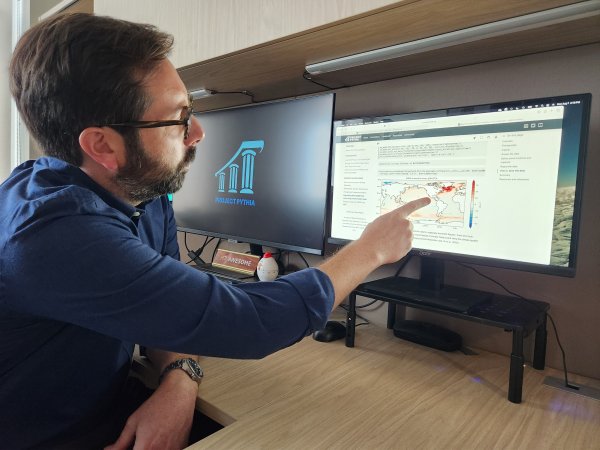Researchers Team Up to Build Open Geoscience Community through $1.6 Million National Science Foundation Project

By Mike Nolan
ALBANY, N.Y. (Aug. 30, 2023) — Brian Rose believes there is a fundamental need for a more open approach to sharing both data and knowledge within the geosciences.
Through a new three-year, $1.6 million multi-institutional project supported by the National Science Foundation (NSF), Rose, an associate professor in the Department of Atmospheric and Environmental Sciences at the University at Albany's College of Arts and Sciences, along with research collaborators at the University Corporation for Atmospheric Research (UCAR) and 2i2c, plan to fill that need through the growth of an online, community resource.
The funding supports phase two of “Project Pythia,” a collaborative effort to collect high-quality interactive learning tools for Python-based data analysis and visualization in the geosciences, all hosted on a freely available website.
With new support, the research team aims to make Project Pythia a “go-to” educational resource for the geoscience community, helping tackle significant technical barriers around data access and analysis.
“Let’s say you’re a student staring down a new research project. How do you get started? For many of us during graduate school, the answer was essentially to ask around among our research advisors and fellow students,” said Rose, the project’s lead principal investigator. “There are so many ways in which this inside knowledge approach gets in the way of inclusive and reproducible scientific progress.
“Project Pythia is building a community around open datasets and openly shared computational workflow knowledge, taking advantage of cloud computing to level the playing field for students, educators and scientists.”
Pythia Cookbooks
Project Pythia started in 2020 with previous support from the NSF. Rose has been heavily involved with the project since then, chairing its education working group and overseeing the creation of Pythia Foundations.
This next phase will focus on growing what the researchers call Pythia “cookbooks,” which are essentially a collection of “raw ingredients” (publicly available data) that can be transformed into scientifically useful results at the click of a button.
Over the next three years, the research team plans to dramatically increase the amount of cookbook content and the community of scientists, educators and students in geosciences that are using and contributing to them.
“It’s essentially a crowd-sourcing approach to build a vibrant clearinghouse of knowledge and best practices in geosciences, particularly for working with large, cloud-hosted datasets and specialized scientific software packages that are needed for analysis,” Rose said. “With a focus on open-access and cloud-based content, ultimately we are trying to reduce barriers to participation and to scientific progress.”
Along with assisting researchers, the cookbooks will serve as a valuable classroom resource, according to Rose. Everything developed through Project Pythia is free and available to the public.
“Project Pythia is already an excellent classroom resource because it starts from the beginning and teaches everything a student or working scientist needs to get started using open-source Python tools,” said Rose. “I anticipate sending lots of students to look for the ‘getting started’ help that they need from our cookbooks. And when we go looking for an example and can’t find it, then we have a great motivation for developing new content.”
Advancing Open Science
The next three years of NSF funding will be split between UAlbany ($489,545), UCAR ($710,411) and 2i2c ($344,941). There is also an additional $54,000 in commercial cloud computing credits to support the project.
At UAlbany, the funding will support graduate students and staff who are active on the project, including Kevin Tyle, a senior program analyst in the Department of Atmospheric and Environmental Sciences and Robert Ford, a graduate student in atmospheric science.
UCAR manages the National Center for Atmospheric Research and Unidata, two partners on the project. Funds will support project personnel at both institutions who will work on developing and maintaining cookbook content and the underlying software infrastructure. 2i2c is a nonprofit that designs, develops and manages open-source cloud computing services for research and education.
The research team recently hosted a summer community workshop to raise awareness about the project and encourage involvement. They plan to host similar events through the new NSF support.
Existing cookbooks are available at: cookbooks.projectpythia.org





